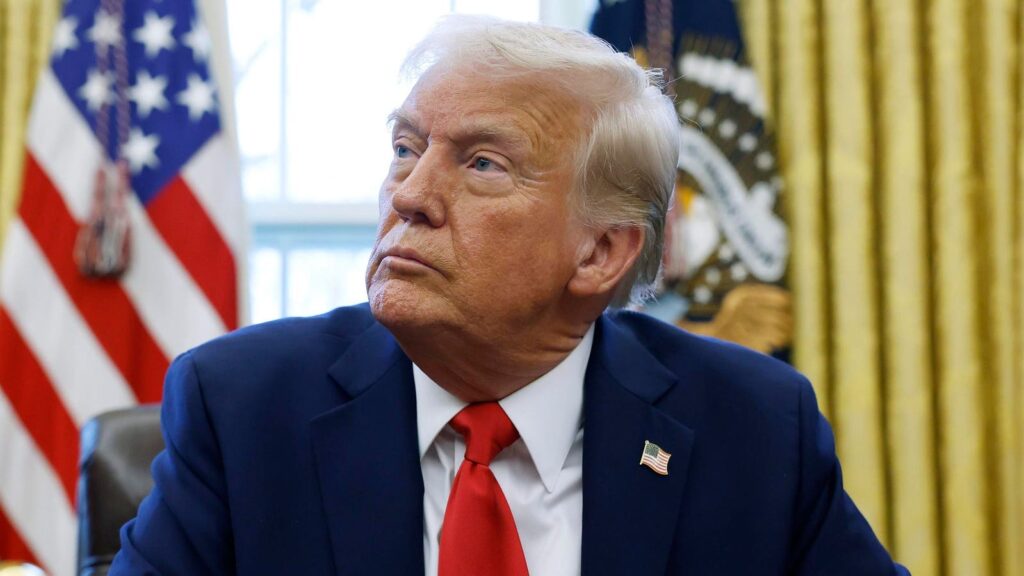Topline
A federal judge blocked parts of President Donald Trump’s executive orders targeting diversity, equity and inclusion on Friday, arguing his orders directing government grant recipients to halt DEI programs are too vague to be enforced or infringe on free speech.
Trump signed an executive order targeting DEI on his first day. (Photo by Anna Moneymaker/Getty … [+]
Key Facts
U.S. District Judge Adam Abelson, who was appointed by former President Joe Biden, said Trump’s orders were vague, stating the orders “do not define any of the operative terms,” including “DEI,” “equity-related” or “illegal DEI and DEIA policies.”
Abelson said Trump’s orders leave federal employees and recipients of government grants with “no idea whether the administration will deem their contracts or grants, or work they are doing, or speech they are engaged in” to be related to DEI.
Trump’s executive order gives employees and grant recipients “no reasonable way to know what, if anything, they can do to bring their grants into compliance,” Abelson said, describing hypothetical scenarios including a government grant being used to fill potholes in a low-income neighborhood as potentially being deemed equity-related.
In a day-one executive order, Trump directed federal agencies and grant recipients to terminate DEI offices and positions and “equity-related” grants or contracts.
Abelson granted a preliminary injunction requested by the city of Baltimore and higher education groups who sued the Trump administration, arguing his executive orders targeting DEI were made to “chill” free speech.
How Has Trump Targeted Dei In Executive Orders?
On his first day in office, Trump issued an executive order titled “Ending Radical And Wasteful Government DEI Programs And Preferencing,” which ordered federal agencies to eliminate DEI offices and positions and “DEI or DEIA performance requirements for employees,” and for government grant recipients or contractors to abandon “equity-related” projects. In other executive orders, Trump has targeted transgender people, barring them from military service and directing their passports to reflect their sex assigned at birth. Trump has framed his anti-DEI executive orders as efforts to support merit-based hiring, and he has called his executive orders concerning the trans community measures to support women’s rights.
Have Trump’s Executive Orders Faced Legal Challenges?
The Trump administration has already faced several lawsuits over his executive orders targeting DEI. Several civil rights groups, including the NAACP Legal Defense Fund and Lambda Legal, sued the administration earlier this week, alleging his DEI executive orders were an overreach of presidential authority and are discriminatory. Trump’s executive orders targeting transgender people have also faced legal challenges. A group of trans people, represented by the American Civil Liberties Union, sued the administration earlier this month alleging his executive orders discriminate against individuals based on sex and transgender status and infringe on rights to free speech and expression.
What Companies Have Rolled Back Dei?
Various private companies have rolled back their DEI commitments in anticipation of, or in response to, Trump’s actions gutting DEI across the federal government. Companies including Meta, Amazon, Citigroup, Pepsi, Target and Walmart have cut some of their diversity programs. Target said it made changes to its diversity policies, which included cutting racial hiring targets and no longer participating in external diversity surveys, to stay “in step with the evolving external landscape,” likely referencing Trump’s executive orders. Other companies, including Costco, Delta and the NFL, have resisted pressure to abandon their DEI commitments. Costco’s shareholders nearly unanimously rejected a proposal that would have required the company to evaluate the risks of its DEI programs.
Further Reading
Citigroup Rolls Back Diversity Initiatives—Here Are All The Companies Cutting DEI Programs (Forbes)
Read the full article here
